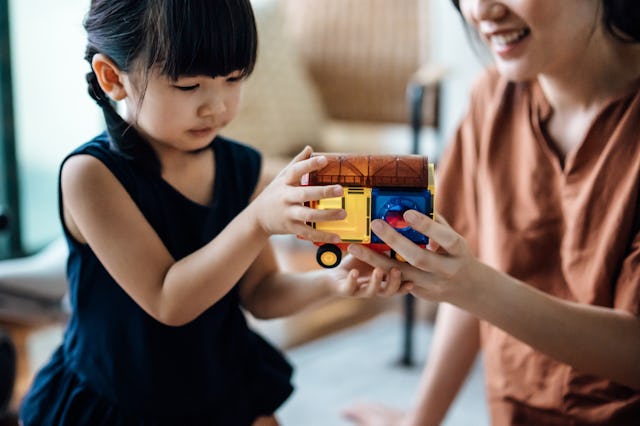“Special Time” Sessions With Your Kids Take 5 Minutes And Have Huge Benefits For You Both
It’s researched-based and actually fits into schedules realistically.

Every mom can agree that there are just not enough hours in the day. That phrase, “You have the same amount of hours in the day as Beyoncé!” is just simply not true. She has a chauffeur and a chef and tutors for her kids. In most normal households, all those “jobs” are added to mom’s resumé. Add a full-time career on top of that, and moms are spread so incredibly thin.
The guilt of not spending enough “quality” time with kids can weigh heavily and lead any mom to beat up on herself when it seems like there is a disconnect between herself and her children — especially if they’re not exactly using their “listening ears.”
There might be good news on the horizon for insanely busy moms (Is that a redundant phrase?). A simple, quick strategy that is widely recommended by children's health professionals recommends just five minutes of daily connection between a parent and a child through the activity of child-led play.
Called "special time," these uninterrupted moments give young children a chance to interact with their parents without the stress of having to “listen” or follow direction. This ease actually helps strengthen the bond between a parent and a child, according to Roger Harrison, a pediatric psychologist with Nemours Children's Health in Wilmington, Del.
This concept kind of seems like a no-brainer once Harrison elaborates on the method — quality time with another person builds trust, and when trust is built, so is respect.
“Special time increases opportunities for closeness between a parent and child. As that attachment is building, it increases the likelihood that a child is going to listen or value what a parent has to say,” he told NPR.
So, how do you put this method into actual practice? It’s pretty simple.
For at least 5 minutes a day, sit down with your child and join them in anything they want to do. From painting to building blocks or making a fort, put down the phone, close the laptop, and give your child your full attention during an activity of their choice.
Child psychologist Kerrie Murphy notes that it’s important that whatever you’re doing doesn't have a “right or wrong” way to play like a board game or video game. Your kid is in charge of the play for the next few minutes.
Do not ask questions or give them directions.
Parent-child interaction researchers have developed the acronym "PRIDE" to help parents remember the tenets of child-led play. The tenets encourage adults to praise their child for appropriate behaviors, use reflective communication, imitate their play style, describe what is happening during the child-led play, and exhibit genuine excitement about spending time with them.
As for things to avoid doing: giving commands, pointing out “bad behavior,” asking questions, and criticizing your child.
Each caregiver in the household (this means dad, grandma, older sister, etc.) should take turns doing “special time” with each child separately at home. This means if you have more than one child, there’s no killing two birds with one stone here. Don't lump your kids special time together as it will totally defeat the purpose.
It might seem like five minutes is such a small amount of time to make any sort of difference in your child’s behavior, but it’s back by science.
A 2017 review of literature, focused on parent-child interaction therapy, included many excerpts about the power of “special time,” noting it as an "effective intervention for a myriad of emotional and behavioral difficulties" mainly in children aged 2-7 since it was developed in the 1970s. And it's been shown to boost attention spans and social skills in children.
Parents are also benefiting from this “special time.” According to the literature review, several studies have shown “increases in positive parenting skills and decreases in negative parenting skills” in families regularly practicing this method.
While it might seem like there is just no time for even a moment to ourselves as moms, I think we can all spare five minutes if it means a better connection with our kids.
This article was originally published on